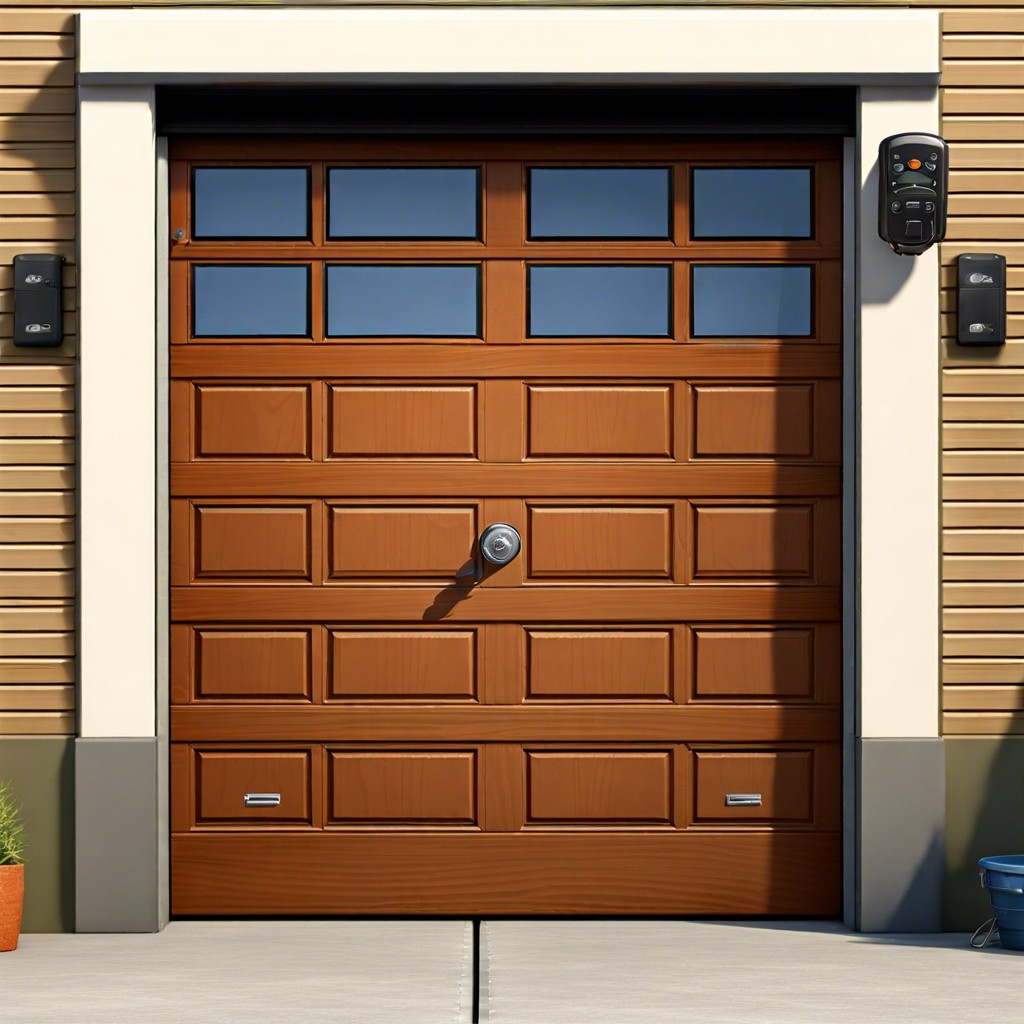If your garage door is opening by itself, this article reveals the common causes and practical solutions to fix the issue.
Key takeaways:
- Stuck buttons or low battery power in remote can cause issue.
- Identical frequencies with neighbor’s opener can trigger unwanted openings.
- Debris blocking sensors can lead to erratic door behavior.
- Misaligned sensors or faulty ones may prompt door to open unexpectedly.
- Damaged wiring or faulty electrical circuits can trigger door malfunctions.
Remote and Wall Button Issues

First, let’s talk about those pesky remotes. Sometimes the issue is as simple as a stuck button. Overzealous pressing or a coffee spill—hey, we’ve all been there—can lodge the button in a semi-pressed state, sending mixed signals to your garage door.
Next up, batteries. Remote batteries have a knack for dying at the most inconvenient times. Low battery power can lead to erratic signals, causing your garage door to play peek-a-boo with you.
Finally, consider the wall button. Loose wires or a finicky switch could be the culprits behind the mystery openings. Give it a gentle wiggle. If it’s loose, you’ve found your mischief-maker.
Identical Frequencies/Codes Interference
Alright, so here’s the scenario: Your neighbor’s garage door also opens when you hit your remote. Sounds like the start of a friendly feud, but it’s actually a case of identical frequencies and codes interference.
Garage door openers often operate on specific frequencies. If your neighbor’s opener uses the same frequency or code, both doors might play follow-the-leader. Boom, instant neighborhood mystery.
- Here are some things you can check and do:
- Reprogram your remote. Most modern openers let you shuffle the codes like you’re mixing a deck of cards.
- Inspect the frequency settings. Sometimes, simply switching to a different one can solve the problem.
- Invest in a more modern system. Older systems are more likely to fall victim to interference.
Got interference? Use these tricks to straighten it out. Save your peace, and maybe even your friendship with the neighbor.
Debris and Obstructions At Sensors
Tiny bits of grit or the kids’ errant toy race car can wreak havoc on your garage door sensors. These sensors are like the eyes of your garage door system, and when they get obstructed, all kinds of weird things start happening—like your door deciding it has a mind of its own.
Points to consider:
- Dust and grime build-up can block the sensors, making them think there’s an invisible obstruction.
- A small object, like a leaf or a spider web, can disrupt the sensor’s signal, causing the door to operate haphazardly.
- Regularly checking and cleaning the sensor’s lenses with a soft cloth helps prevent this issue.
- Ensure nothing is physically blocking the path between the sensors.
Maintaining a clear path for these sensors ensures that your garage door only opens when you want it to, not because it thinks the phantom of your house is making a visit.
Misaligned or Faulty Safety Sensors
When sensors get out of alignment, it’s like a poorly aimed selfie—a real annoyance! The sensors, those tiny gadgets on either side of your garage door, need a clear line of sight to work correctly. If they’re giving each other the silent treatment, your garage door might decide to act out and open on its own.
Also, those sensors are sensitive to dirt. Even a cobweb can confuse them. Clean them regularly to ensure they can “see” clearly.
Sometimes, these sensors can simply go rogue. Faulty sensors might send mixed signals because they’re just not feeling their best. In that case, it’s usually best to swap them out for new ones. Your garage door will thank you, and so will your sanity.
Keep things light and bright in the sensor world, and you’ll keep those rogue door openings at bay!
Damaged Wiring or Electrical Circuits
Think of your garage door opener’s wiring like your Aunt Mildred’s knitting – one wrong snag, and things unravel. A nicked wire or an electrical fault can make your garage door go haywire.
First, inspect the wires connected to the opener. Frayed or exposed wires? Bingo! You’ve found your culprit. Electrical tape can temporarily fix minor damage, but call a pro for anything more serious.
Second, check the connections. Loose wires might not be making proper contact. Tighten any screws and ensure all connections are snug.
Lastly, don’t dismiss the circuit board – the mastermind behind the operation. Over time, circuit boards can develop issues. A replacement might be necessary.
Be the Sherlock Holmes of wiring; every detail matters!